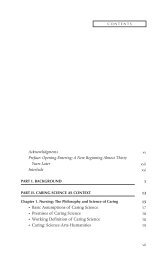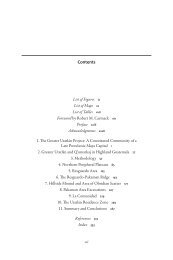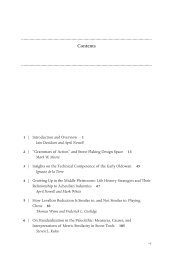free download - University Press of Colorado
free download - University Press of Colorado
free download - University Press of Colorado
Create successful ePaper yourself
Turn your PDF publications into a flip-book with our unique Google optimized e-Paper software.
Jago Cooper<br />
The absence <strong>of</strong> other causes <strong>of</strong> sudden environmental change in this chapter—namely<br />
earthquakes, volcanoes, and the impacts <strong>of</strong> El Niño/La Niña—<br />
should not be taken as an indication <strong>of</strong> their relative lack <strong>of</strong> importance. Rather,<br />
these major causes <strong>of</strong> sudden environmental change would not be given justice<br />
in this short chapter; they require, and receive, their own standalone discussion<br />
elsewhere (Handoh et al. 2006; Scheffers et al. 2009). However, the key<br />
discussions in this chapter that focus on mitigation and resilience to floods,<br />
droughts, and wind shear by Precolumbian populations have a direct relevance<br />
to all discussions <strong>of</strong> human engagement with sudden environmental change in<br />
the region. In fact, different causes behind sudden environmental change were<br />
less important for past human communities than was the similarity in their<br />
impacts on the local environment.<br />
Therefore examples <strong>of</strong> past human engagement with the consequences <strong>of</strong><br />
sudden environmental change <strong>of</strong>ten have relevance beyond their specific source<br />
<strong>of</strong> origin and geographical context. This is not because universal rules can be<br />
identified in human mitigation and transferred between different geographical<br />
regions and time periods; rather, each case study examined in isolation provides<br />
one way in which the variables <strong>of</strong> climate, environment, and human experience<br />
have played out in the past. By increasing the number <strong>of</strong> “case studies” or “experiments”<br />
(Nelson et al. this volume) and looking at the relationship between<br />
cause and effect, decisions and decision making, planning and chance, we can<br />
improve our understanding <strong>of</strong> these relationships within a global ecodynamics<br />
framework that helps us to better understand hazards, mitigate impacts, and<br />
avoid disasters. These wider lessons suggest that this Precolumbian “case study”<br />
is relevant for modern-day populations <strong>of</strong> the Caribbean, and the combination<br />
<strong>of</strong> case studies presented in this book has important lessons for the wider populations<br />
<strong>of</strong> the world that currently face sudden environmental change (Alley et<br />
al. 2003: 2005; Lenton et al. 2008).<br />
The terms vulnerability, hazard, impact, and resilience are increasingly finding<br />
their way into academic and policy literature, although their meanings can<br />
<strong>of</strong>ten be appropriated differently by different disciplines. The term vulnerability<br />
is used in this chapter to describe exposure to hazards when the hazard is a<br />
potential threat to a past community that has not yet been manifested. Impacts<br />
are the consequences <strong>of</strong> a hazard; they can be both direct and indirect in nature<br />
and are relative as a result <strong>of</strong> potential mitigation strategies that can reduce<br />
their impact through intentional or unintentional preparation. Resilience is a<br />
more complex term to use given the extensive discussion <strong>of</strong> its role in ecological<br />
and social theory; however, in this chapter it is used in its broadest sense to<br />
refer to the relative ability and mechanisms with which past communities lived<br />
through the impacts <strong>of</strong> sudden environmental change while maintaining their<br />
core lifeways (Redman and Kinzig 2003).<br />
92





